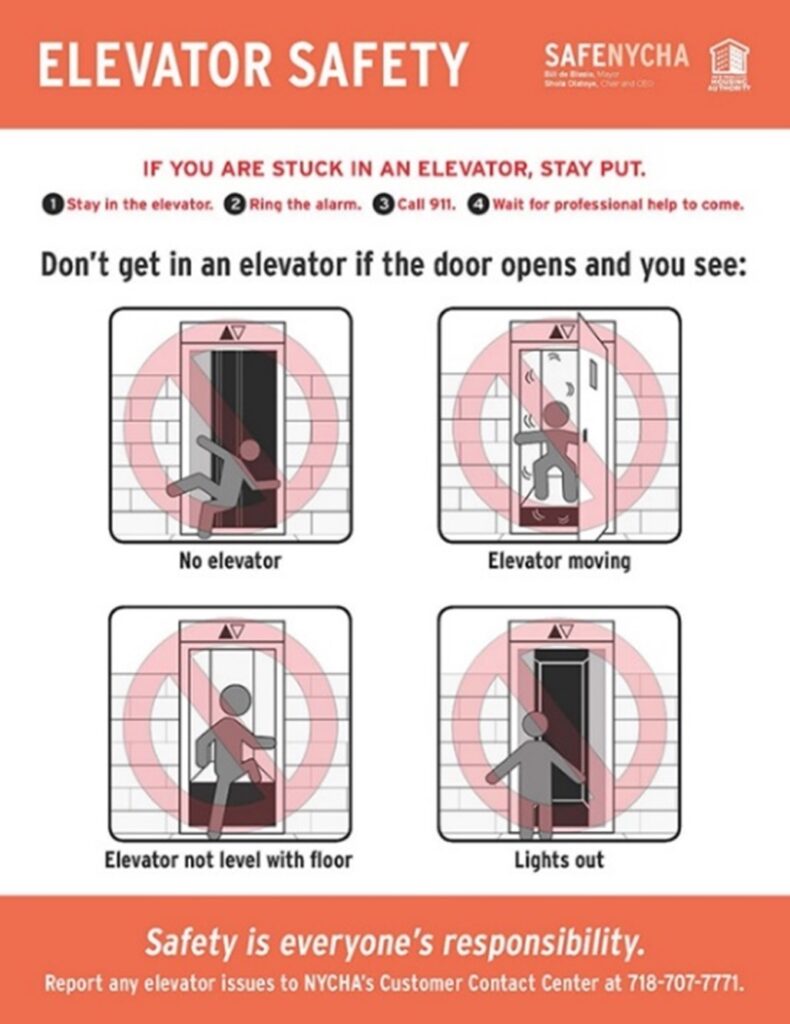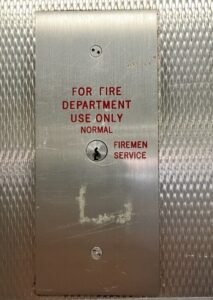Read “Healthy Happenings,” the EHS Newsletter
Every year, the National Safety Council and the National Elevator Safety Foundation recognize the third week of November as “Elevator Safety Week” to bring awareness to elevator safety. Elevators began revolutionizing daily life in the United States in the late 1800s, making it possible to build taller buildings in which many more people could safely and comfortably live and work than ever before.
Today, it’s important to take a moment to consider elevators’ importance to our way of life and how to use them safely. At NYCHA, safe and proper elevator operations and maintenance help ensure that residents can leave and return to their homes safely.
Elevator Oversight Team
NYCHA’s Environmental Health and Safety Department (EHS) Elevator Oversight Team (EOT) oversees the Authority’s Elevator Services and Repair Department (ESRD). The EOT conducts various inspections to verify compliance with regulations and safety mandates. If any NYCHA elevator experiences an excessive number of unplanned outages in a 30-day period, the EOT will investigate and analyze the situation to determine the cause of those outages; it will then recommend to ESRD improvements to ensure safe and reliable elevator service at that location.
The EOT’s extensive knowledge about the maintenance, repair, and inspection of passenger elevators, as well as elevator regulations and safety requirements, help them identify safety and performance issues.

EOT specialists inspecting the inside of the car.
Over a Billion Elevator Trips Each Year
NYCHA maintains 3,090 elevators in 2,103 residential buildings throughout our hundreds of developments across the five boroughs. NYCHA elevators make approximately 1.2 billion trips per year, providing service 24 hours every day, 365 days a year.
Safety Tips
Please take note of these important elevator safety guidelines:

- Look down. Make sure the elevator is level with the floor as you enter and exit.
- Use the ‘Door Open’ button to keep your elevator’s doors open – not your body.
- Don’t lean on the elevator doors.
- Keep clothing clear of elevator doors, including ties and scarves.
- Be patient and don’t crowd the elevator –overloaded elevators can get stuck.
- Don’t jump in elevators –jumping can cause an elevator to become uneven with the floor or get stuck.

Fire Service Keys
Elevator fire service keys may only be used by authorized NYCHA personnel, and members of the New York City police and fire departments, for safety purposes.
Non-authorized use of fire service keys by non-authorized users may cause the elevator to become inoperable, entrap passengers, or stop or descend suddenly.
If you see an unauthorized person putting a key into areas labelled “For Fire Department Use Only” in elevators or the lobby, please report it at on.nyc.gov/submit-concern.

Contact EHS
EHS encourages NYCHA residents to report any unaddressed, previously reported safety conditions by calling the Customer Contact Center at 718-707-7771 (select menu option 7, then option 3).
If you have questions about this or any environmental health and safety matter, please email ehs@nycha.nyc.gov.

